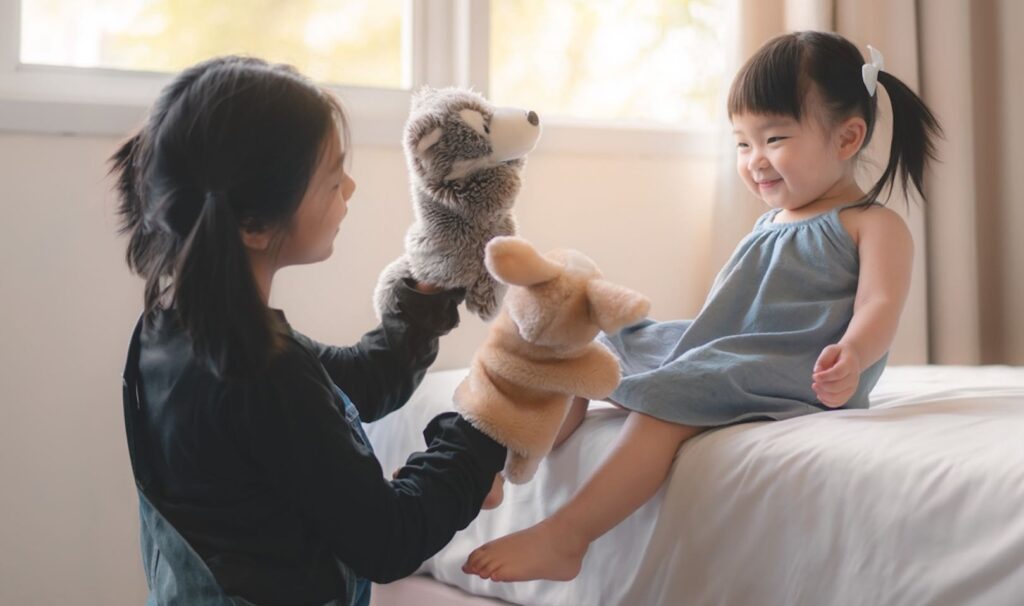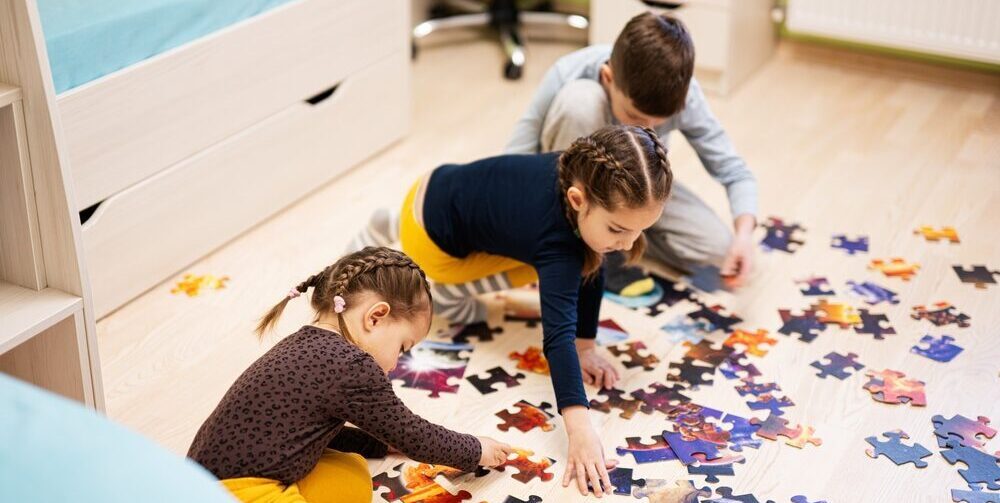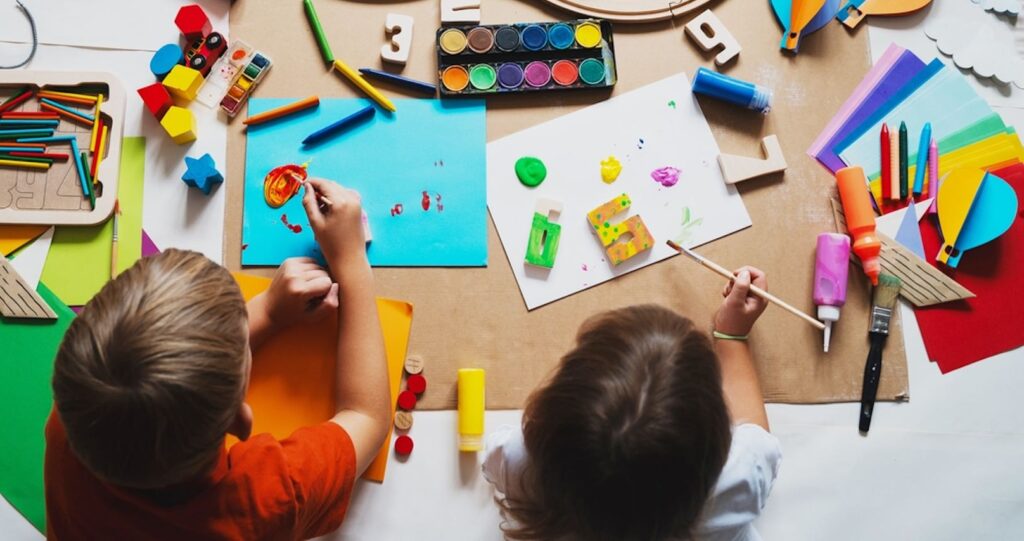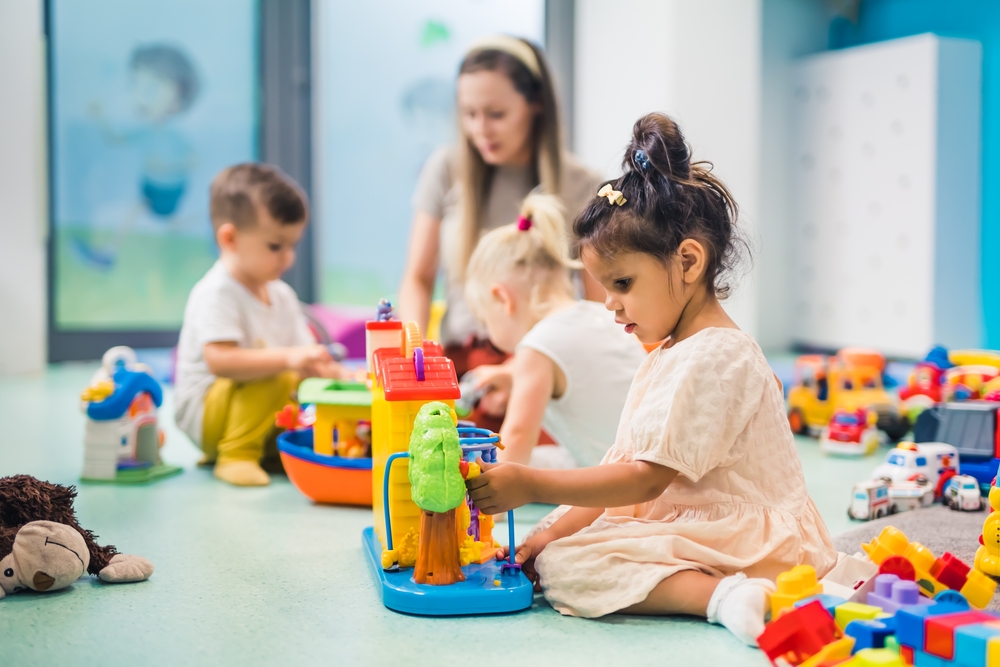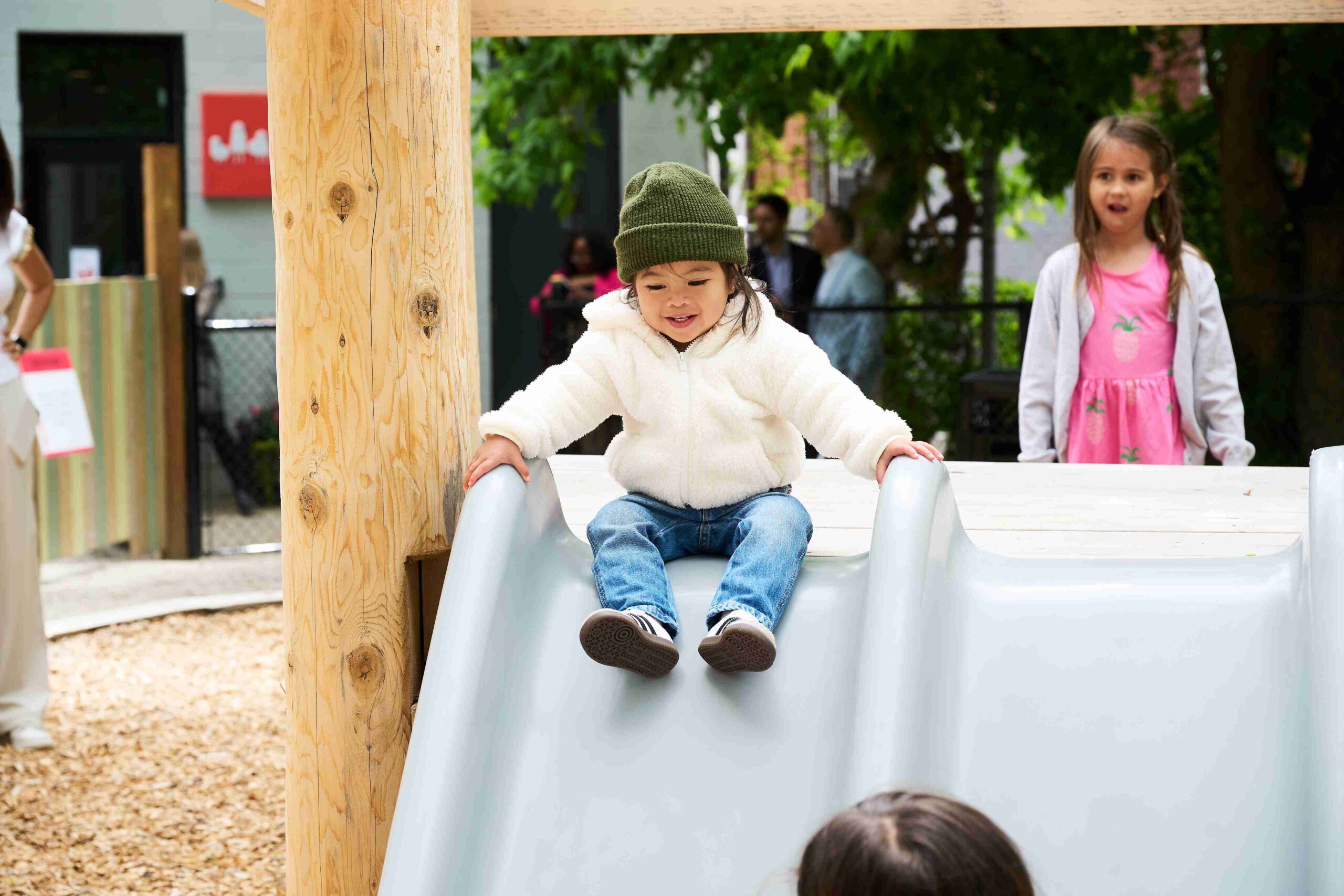Looking for fun, educational activities for preschoolers? Preschoolers (aged 3 to 5) are naturally curious, energetic, and eager to learn about the world around them. The best activities combine movement, creativity, and problem-solving to help children strengthen memory, language, and early math skills.
At The Learning Nest, we believe in creating dynamic environments where learning happens naturally through exploration and interaction. Our premium daycare centres in North York and The Junction are designed to offer a rich variety of experiences that nurture every aspect of a child’s development.
Whether you’re a parent at home or an educator planning your week, this guide highlights ten hands-on activities that support your preschooler’s learning through play.
The Power of Social Learning in Preschool
For preschoolers, every interaction is a chance to grow not just as individuals, but as part of a community. Social learning, which emphasizes learning through interaction, observation, and shared experiences, plays a vital role in early childhood education. When children engage in meaningful activities alongside peers and caring educators, they develop important life skills like communication, cooperation, and empathy, all while building foundational abilities in memory, language, and problem-solving.
“At The Learning Nest, we intentionally balance independent and social-based learning to support whole-child development. Independent activities build confidence, focus, and problem-solving skills, while social learning fosters communication, cooperation, and empathy. This blend helps children grow into capable, confident, and emotionally aware learners.”
– Melissa Capogna, North York Centre Director
Here are ten activities designed to be both fun and highly beneficial for preschoolers, supporting their memory, problem-solving, and early math and language abilities:
1. Storytime and Puppet Shows
Reading aloud and storytelling are powerful tools for language development and memory. Add puppets or simple props to make storytime interactive. Encourage your child to retell the story, ask questions, or invent story endings.
Skills Boosted:
- Language & Literacy: Expands vocabulary, improves narrative skills, develops understanding of story structure, and enhances verbal expression.
- Memory: Recalling plot details and character lines from familiar stories.
- Problem-Solving: Children might invent solutions within their narrative or figure out how characters would react in various scenarios.
- Social-Emotional: Develops empathy by understanding other perspectives.
Tips:
- Choose books with repetitive phrases and rhymes.
- Let your child “read” by describing the pictures or acting out scenes.
2. Building with Blocks and Construction Sets
Provide various building materials, like wooden blocks, LEGO DUPLO, magnetic tiles, or even cardboard boxes. Encourage them to build towers, houses, bridges, or anything they imagine.
Skills Boosted:
- Early Math: Develops understanding of shapes, sizes, spatial relationships, balance, and early concepts of measurement and geometry.
- Problem-Solving: Children learn through trial and error, how to stabilize a structure, or how to fit pieces together.
- Fine Motor Skills: Manipulating blocks refines hand-eye coordination and dexterity.
- Creativity: Allows for open-ended construction and imaginative play.
Tips:
- Start with larger, easier-to-handle blocks for younger preschoolers.
- Introduce challenges like “build a tower taller than you” or “build a house for your toy animal.”
3. Simple Board Games and Puzzles
Introduce age-appropriate board games (like “Candyland” or “Chutes and Ladders”) and jigsaw puzzles (20-50 pieces). Focus on the process and taking turns, rather than just winning.
Skills Boosted:
- Memory: Remembering game rules and sequences.
- Problem-Solving: Strategizing moves in games, or figuring out how puzzle pieces fit together.
- Early Math: Counting spaces, recognizing patterns, understanding numerical order.
- Social Skills: Learning to take turns, follow rules, and handle winning and losing with grace.
Tips:
- Start with simple matching or shape-sorter puzzles before moving to jigsaw puzzles.
- Reinforce the concept of taking turns and encourage good sportsmanship.
4. Sorting and Classification Games
Gather a collection of household items (buttons, beads, small toys, socks, leaves). Ask your child to sort them by colour, size, shape, or type. You can also use nesting cups or sorting trays.
Skills Boosted:
- Early Math: Develops critical thinking about attributes, sets, and patterns; foundational for logical reasoning and categorization.
- Problem-Solving: Determining criteria for sorting and applying them consistently.
- Cognitive Development: Enhances observational skills and the ability to notice subtle differences and similarities.
Tips:
- Begin with one sorting attribute (e.g., “put all the red things here”).
- As they get more skilled, introduce multiple attributes (e.g., “sort by colour AND size”).
5. Nature Exploration and Sensory Bins
Spend time outdoors observing nature: leaves, rocks, insects, clouds. Create sensory bins indoors with rice, beans, water, sand, or pasta, adding small toys, scoops, and containers for exploration.
Skills Boosted:
- Science & Observation: Direct exposure to natural phenomena, encouraging questions and discovery about the world.
- Fine Motor Skills: Scooping, pouring, and manipulating small objects in sensory bins.
- Sensory Processing: Engages multiple senses, promoting brain development.
- Language: Describing textures, colours, and observations, expanding descriptive vocabulary.
Tips:
- Before going outside, talk about what you might see and collect.
- For sensory bins, provide a variety of tools, like measuring cups, funnels, or small animal figures.
6. Rhyming and Word Games
Play games like “I Spy” with rhyming words (“I spy something that rhymes with cat!”). Read rhyming books, sing rhyming songs, or make up silly rhymes together.
Skills Boosted:
- Language & Literacy: Develops phonological awareness (the ability to hear and manipulate sounds in spoken words), a critical pre-reading skill.
- Memory: Remembering rhyming pairs and patterns.
- Auditory Discrimination: Training the ear to hear subtle differences in sounds.
Tips:
- Point out rhyming words as you read books.
- Make a game out of finding objects around the house that rhyme.
7. Simple Cooking and Baking
Involve your preschooler in simple kitchen tasks, like stirring, pouring (with supervision), washing vegetables, or counting ingredients. Even making a sandwich together offers learning opportunities.
Skills Boosted:
- Early Math: Counting ingredients, understanding fractions (half, whole), measuring (scoops, cups).
- Problem-Solving: Following a sequence of steps, understanding cause and effect (e.g., what happens when you mix ingredients).
- Fine Motor Skills: Stirring, pouring, and using child-safe kitchen tools.
- Language: Learning new action verbs and food-related vocabulary.
Tips:
- Start with no-bake recipes or simple tasks, like tearing lettuce for a salad.
- Talk through each step: “First, we add the flour, then we stir.”
8. Art and Craft Exploration
Provide open-ended art materials, like paper, crayons, washable paint, playdough, child-safe scissors, and glue. Focus on the process of creation rather than the final product.
Skills Boosted:
- Fine Motor Skills: Gripping tools, cutting, moulding, painting, enhancing hand strength and coordination.
- Creativity: Expressing ideas and emotions non-verbally.
- Problem-Solving: Figuring out how to create specific shapes or how colours mix.
- Sensory Exploration: Engaging with different textures and materials.
Tips:
- Offer a variety of materials to encourage different sensory experiences.
- Display their artwork prominently to build confidence.
9. Outdoor Gross Motor Play
Encourage active play outdoors: running, jumping, climbing on playground structures, riding a tricycle, throwing and catching balls.
Skills Boosted:
- Gross Motor Skills: Develops balance, coordination, strength, and agility.
- Problem-Solving: Navigating obstacles, estimating distances, and understanding spatial awareness.
- Cognitive Development: Outdoor play has been linked to improved concentration and attention.
- Social Skills: Playing with others fosters cooperation and turn-taking.
Tips:
- Visit different types of playgrounds to introduce new challenges.
- Organize simple outdoor games, like “follow the leader” or “red light, green light.”
10. Memory Matching Games
Start with a small set of matching cards (e.g., 6-8 pairs). Lay them face down and have your child turn two cards over at a time, trying to find a match. Gradually increase the number of cards as their memory improves.
Skills Boosted:
- Memory: Directly trains short-term and working memory.
- Concentration: Requires focus and attention to remember card locations.
- Visual Discrimination: Helps identify identical images or patterns.
- Patience: Encourages waiting for turns and persisting through challenges.
Tips:
- Use cards with familiar objects or characters.
- Encourage them to say the names of the items as they flip the cards.
Ready for The Learning Nest’s Preschool Journey?
Engaging preschoolers in activities that strengthen memory, problem-solving, and early academic skills is incredibly rewarding – for children, parents, and educators alike. The best part? It all starts with hands-on learning and daily opportunities for exploration.
At The Learning Nest, we weave engaging, hands-on experiences into every part of our daily curriculum at both our North York and The Junction locations. From language-rich activities that build early literacy skills to educator guided activities that support problem-solving and early math, we’re committed to nurturing curious, capable, and confident learners.
Our classrooms reflect the quality of our programs – thoughtfully designed and equipped with a wide variety of learning materials that inspire exploration and creativity. Most importantly, our approach supports each child as an individual, helping them grow in the areas where they shine.
Come see the difference for yourself – we’d love to show you around!
Contact us today to schedule a visit or speak with one of our team members

